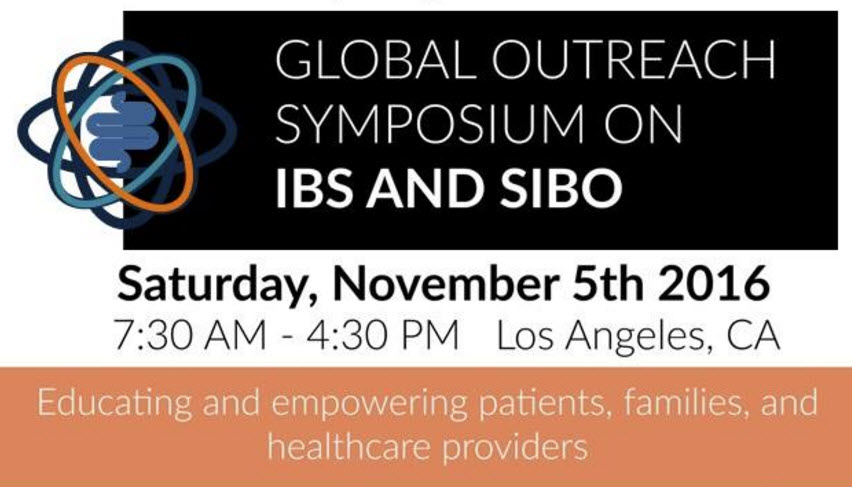Review by Dr. Nirala Jacobi, ND
This conference took place on Nov 5th in Los Angeles, CA and was also webcasted.
Prominent speakers included Dr Mark Pimentel and Dr Ali Rezae, Gastroenterologists from the Cedars-Sinai Motility clinic, and Dr Ruchi Mathur, an Endocrinologist at Cedars- Sinai.
I will highlight only those areas which I found interesting and useful to share.
To purchase the full webcast: https://www.regonline.com/2016GlobalIBSSIBO
No natural treatments were discussed. A section on probiotics was (in my opinion) fairly disappointing and a section on low FODMAP diets fairly basic and so will not be covered here.
My COMMENTARY is made where appropriate. Apologies for the long post but I think it is useful.
General information:
- It is estimated that the global prevalence of IBS is 11.3%. 60% of all cases of IBS are actually SIBO which means that there are roughly 508 MILLION SIBO sufferers worldwide. We heard from doctors in Korea, Mexico, and the UK and all report various levels of SIBO awareness in their countries ranging quite a bit.
- Deep sequencing of bacteria in the small intestines of healthy subjects show that bacterial count should be low (less than 1000cfu/ml in the jejunum) but should be diverse. Less diverse microbiomes are linked to IBS
- Methane is linked to weight gain as is helps hydrogen producers work more robustly and therefore extract calories from food
- Methane and Hydrogen elevation at the same time (common in SIBO) was found in those IBS patients with the highest BMI
- Food additives and emulsifiers: In animal studies polysorbate 80 and carboxymethylcellulose were shown to disrupt mucosal/microbial interactions and promote inflammation, obesity, liver dysfunction, and higher body weight
- Patients treated with Rifaximin: 72% responded to one treatment round, and of those 36% had > 6 months benefit.
Testing- finally some consensus
As anyone who follows SIBO research knows, a major hurdle in this field is the administration and interpretation of breath tests which can differ from study to study. Many will use lactulose results as a measure of transit time, whereas others will use lactulose as a test substrate.
A North American Consensus meeting, including 8 major medical schools from the US, Canada, and Mexico represented by prominent gastroenterologists finally agreed on a consensus statement on recommendations for breath testing in the diagnosis of SIBO.
These are their guidelines:
- Fasting 8-12 hours before testing
- Avoid antibiotics 4 weeks prior to testing
- No physical activity before testing as this alters the CO2 levels
- Using 10g of Lactulose and 50-75g of Glucose as substrate
- PPI’s – no need to stop these prior to testing
- Prokinetics and Laxatives: stop 1 week before testing
- Breath testing is NOT a good way to assess oro-cecal transit time (studies implying this have not been reproduced)
- A flat line throughout the entire breath test on both Hydrogen and Methane is indicative of Hydrogen sulfide gas
- Methane of 10ppm anytime during the test is positive (see later section on IBS-C)
- Hydrogen: a rise of 20ppm over baseline by 90 minutes is positive
- High Hydrogen at baseline (usually considered to be a non-compliant patient who did not follow prep diet protocol). There is now a thought that this may be a third type of SIBO—a different type of hydrogen producing bacteria. Stay tuned.
COMMENTARY ON THE CONSENSUS STATEMENT:
Happy to report that SIBOtest has been following these testing guidelines since the beginning. To now have a consensus statement which validates the Lactulose breath test as a test, not a measure of oro-cecal transit time is a major breakthrough and should ease the minds of some skeptics out there.
SIBO and IBD
- Methanogenesis is suppressed in inflammatory bowel disease, such as Crohn’s disease and Ulcerative colitis. This is not surprising as hydrogen sulfide can be elevated IBD and this can suppress methane production. A study of 211 IBD patients had the following findings:
- Excessive Hydrogen production was seen in
- 6% Crohn’s patients
- 4% UC patients
- 9 IBS patients
- Excessive Methane production
- 3% Crohn’s disease
- 1% UC
- 6% IBS
- Excessive Hydrogen sulfide (flatline on test)
- 1% Crohn’s disease
- 1% UC
- 2% IBS
- Excessive Hydrogen production was seen in
IBS-C: SIBO or Microbial “Bloom”?
- Methane is produced by the organism Methanobrevibacter smithii. It is now thought that people become constipated only when methane levels reach a certain threshold. This is a departure from the thought that M.smithii must be eradicated for the treatment of constipation. The goal now is to get methane levels below 10ppm on breath test. Best outcomes where seen at <3ppm.
- Methane positive test results: 98% of the time methane on breath testing is elevated from baseline all the way through the testing period. A growing body of researchers and clinicians (myself included) consider this more of an indication of large intestinal M.smithii overgrowth. Methane which rises on breath testing is indicative of SIBO
- Prevalence of excessive methane production increases with age
- As mentioned in the testing section, high methane throughout breath testing is likely to be large intestinal overgrowth (or Bloom) of Methanobrevibacter smithii. Methane will be produced wherever hydrogen producing bacteria are located. This is because methanogens require hydrogen to produce methane. Hydrogen producing bacteria in the SI is SIBO, but hydrogen producers are common in the LI.
COMMENTARY: So to recap:
Methane which is high all the way throughout the breath test is SIBO only if methane actually rises over baseline levels, indicating the hydrogen producer are active in the SI
Methane staying high throughout the test without significant rise is likely to be large intestinal overgrowth of M.smithii.
Both methane in SIBO and LI overgrowth causes IBS-constipation (IBS-C) but this is an important differentiation because we would not need as stringent a diet in LI overgrowth and could possibly use fiber therapeutically
We certainly see the methane phenomenon here at SIBOtest. I also had this conversation with Dr Lenny Weinstock at the SIBO symposium earlier this year who agreed that high methane throughout breath testing is possibly a different condition from SIBO and therefore needs different treatment. Stay tuned.
Post-infectious IBS – the most common cause of SIBO
PI-IBS is also known as “primary SIBO”. “Secondary SIBO” is when SIBO occurs from other underlying conditions, trapping bacteria in the SI.
COMMENTARY Dr Allison Siebecker did an excellent overview of secondary SIBO at the recent SIBO Summit.
The case for PI-IBS being the main cause of SIBO has been fairly well proven at this point. As presented in previous webinars and presentations, a case of gastroenteritis with any of the bacteria which release cytolethal distending toxin B (CdtB) can cause damage to the migrating motor complex (MMC) by the production of autoantibodies against vinculin, a major part of the MMC. These bacteria are Shigella, E.coli, Campylobacter jejuni, C.diff, and Salmonella.
This then means those which have antibodies to vinculin and cytolethal distending toxin B (CdtB) have an actual disease which needs to be managed with periodic antimicrobials when relapse occurs and prokinetics possibly long term
The test which measures anti-vinculin and anti- CdtB antibodies is called IBS check and is not yet available in Australia. If you have a patient who presents with IBS symptoms ever since a case of food poisoning it is very likely that they have primary SIBO. Prokinetics are most important therapy for this type of SIBO.
The newly discovered anti-vinculin antibodies have also been found to be increased in scleroderma, fibromyalgia, pseudo-obstruction, and SLE
PI-IBS – this group is at a much higher risk for subsequent food poisoning, ie the risk of another case of food poisoning increases 3 fold
anti- CdtB antibodies are usually not elevated in Methane dominant cases and anti-vinculin antibodies are only slightly higher in these cases over normal controls. This further illustrates that methane dominant IBS is a different condition from primary SIBO
Motility Prescription Medications (Prokinetics)
This section is also well covered in Dr Siebecker’s recent talk at the SIBO Summit.
Motilin agonists
- Erythromycin 50-62mg before bed (this constitutes of roughly 1/20th of a regular antibiotic dose) – starts MMC in stomach and propagates through SI
- Azithromycin 200mg before bed
5-HT4 agonists
- Prucalopride (Resotrans) – starts MMC from duodenum
Dopamine antagonist
- Domperidone- black box warning due to QT elongation and arrhythmias
Parasympathomimetics
- Pyridostigmine (older drug used for myasthenia gravis) – suppresses reuptake of acetylcholine which induces the MMC via the vagus nerve
COMMENTARY: as we learned at the SIBO Summit, 2/3 of SIBO patients are chronic relapsers, often due to damage to the MMC (1o SIBO). Though many of the abovementioned medications can have side effects, we need to keep an open mind to medications that may significantly improve patients lives until reliable natural alternatives are available
New Concepts for the treatment of SIBO
Plasmapheresis improved one patient’s symptoms with PI-IBS (SIBO) who tested very high for anti-vinculin antibodies. The patient had severely impaired MMC. After plasmapheresis, patient reported improvement lasting 1 month. Plasmapheresis is a process in which the blood is filtered to remove ALL antibodies, however B cells are not filtered so will continue to produce antibodies, hence not curing the patient.
COMMENTARY: rather than a new treatment option for SIBO, I think this case more than anything proves the concept of autoimmunity being the cause of post-infectious IBS (SIBO). Plasmaphereses is costly and has side effects so I don’t think this realistically offers solutions.
New Device for Measuring Hydrogen Sulfide (H2S)
Now being tested at Cedars Sinai. Apparently this could be available soon.
COMMENTARY – currently Quintron’s BreathTracker machines do not measure hydrogen sulfide and all other testing is fairly inaccurate for H2S. so we are all eagerly anticipating more news about this technology.
Lovastatin Blocks Production of Methane
A time release Lovastatin drug called SYN-010 is in final stages of phase lll trials. This follows a published study by Dr Pimentel showing Lovastatin to effectively reduce methane and normalise transit in constipated patients. This time release version of lovastatin will also reach the colon. The idea is that over time hydrogen producers will also reduce their output of hydrogen as it is not used by M.smithii to produce methane.
COMMENTARY as any SIBO treating practitioner knows, high methane cases tend to be the most difficult to treat. SYN-010 may offer some symptomatic relief for those not responding to antimicrobial therapy. Could red yeast rice extract be an alternative?

